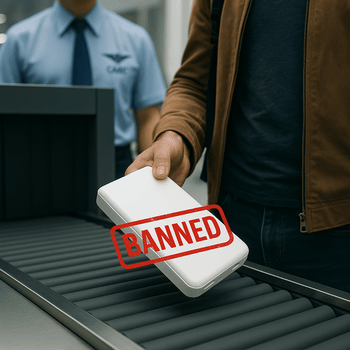
As of June 28, 2025, China’s Civil Aviation Administration (CAAC) has imposed a zero-tolerance policy on power banks that lack proper certification, bear unclear labels, or have been subject to product recalls.
Any passenger attempting to board a domestic flight with these non-compliant devices will face refusal of carriage or confiscation of the device at security checkpoints.
Why the Ban Was Introduced
Over the past year, Chinese authorities have logged an alarming uptick in safety incidents involving passenger-carried lithium-ion batteries.
Instances of overheating, smoking and even small fires onboard aircraft have forced emergency protocols in mid-flight.
Because lithium-ion cells can combust violently under stress or if damaged, regulators decided a preventative strike was necessary to safeguard high-altitude operations and the traveling public.
Understanding 3C Certification
Central to the crackdown is China’s “3C” mark—the China Compulsory Certification for product safety.
For portable chargers, 3C certification guarantees that manufacturer testing has met national standards for battery performance, thermal stability and durability.
Devices without this mark, those with labels that cannot be clearly verified as 3C-compliant, or models officially under recall now face an outright ban from passenger cabins and checked luggage alike.
Major Recalls Triggering the Move
Several prominent power-bank manufacturers have been hit with recalls in recent weeks:
- Shenzhen Romoss Technology voluntarily recalled some 490,000 units of three fast-charging models on June 16, citing risks of overheating and combustion. Its 3C certification for those products was suspended by June 20, leading to their removal from e-commerce platforms such as Douyin.
- Anker Innovations initiated a global recall of 1.15 million units in the U.S. on June 13 and followed up with 710,000 more units in China on June 20. Investigations uncovered unauthorized material changes in battery components that could degrade safety after prolonged usage.
- Other brands, including Baseus and Ugreen, have seen selected power-bank lines stripped of their 3C credentials by the national market regulator, sparked by similar safety-related concerns.
These high-volume recalls underscored a systemic risk that ultimately catalyzed the CAAC’s airline-wide prohibition.
What the New Directive Requires
Under the CAAC’s urgent notice, airlines and airports must now:
- Inspect All Portable Chargers. Security personnel are instructed to identify and reject power banks lacking valid 3C labels or on recall lists.
- Train Staff for Battery Emergencies. Cabin and ground crews must refresh procedures for responding to thermal runaway or smoke detection incidents.
- Launch Public Awareness Campaigns. Posters, announcements and digital advisories at airports will remind travelers of the ban and the hazards of uncertified devices.
- Strengthen Reporting. Any near-miss or incident involving lithium batteries must be logged and shared with the CAAC for ongoing risk analysis.
How Passengers Can Comply
To avoid disturbances on travel day, follow these steps:
- Verify Your Power Bank’s Label. Look for a legible “3C” logo and manufacturer details. If in doubt, check the official China Product Certification Center database online.
Quick Guide: You just need to enter the manufacturer’s name in the “制造商 Manufacturer” field (for example: Xiaomi or Romoss) and “Power Bank”or “充电宝” in the “产品名称 Product Name” field. - Check Recall Notices. Major brands often publish recall lists on their websites; Airlines may also post official CAAC recall bulletins.
- Carry Proof of Certification. Screenshots or printouts showing your model’s 3C registration can help during manual inspections.
- Pack Correctly. Even certified power banks should be placed in carry-on baggage, with terminals taped or shielded against accidental activation.
Consequences of Non-Compliance
Travelers found carrying banned devices risk:
- Device Confiscation. Uncertified power banks will be seized at security checkpoints.
- Boarding Denial. Passengers may be refused entry into the secure area or onto the aircraft.
- Potential Fines. While rare, authorities can impose monetary penalties under aviation safety regulations.
Best Practices for Traveling with Power Banks
- Mind Capacity Limits. International standards often limit power banks below 100 Wh (watt-hours) for standard carry-on; any device between 100–160 Wh needs airline approval in advance.
- Use Original Cables. Third-party or damaged cables can stress connectors and elevate fire risk.
- Charge in Moderation. Store at no more than 60 %–80 % state of charge for optimal cell health and safety.
Alternatives to Carrying a Power Bank
For short domestic hops, consider:
- Airport Charging Stations. Many terminals now offer USB and wireless charging hubs.
- Onboard USB Ports. Chinese carriers increasingly install power outlets at seats.
- Portable Solar Chargers. For remote itineraries, lightweight foldable panels can top up devices during daytime layovers.
Looking Ahead
Although the ban currently pertains only to domestic flights, experts warn a spillover to international routes may be imminent.
Global aviation regulators are closely watching China’s implementation as a case study in preemptive lithium-battery safety management.
Passengers and manufacturers alike should brace for stricter scrutiny across all flight networks.
Conclusion
China’s June 28 prohibition on non-compliant power banks underscores the serious risks posed by unverified lithium-ion batteries onboard aircraft.
By confirming 3C certification, staying abreast of recall notices and following sound packing practices, travelers can ensure smooth passage through security and a worry-free journey.


